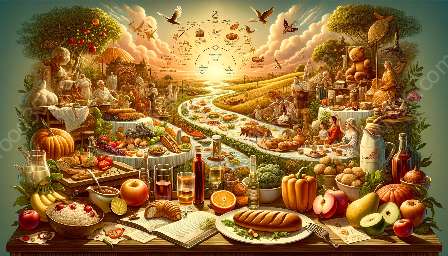The origins of vegetarianism have deep historical roots that intertwine with the evolution of cuisine history. Understanding the historical significance of vegetarianism provides valuable insight into its impact on food culture and society at large.
The Ancient Origins of Vegetarianism
Vegetarianism traces its roots back to ancient civilizations, where the practice of abstaining from meat was often associated with religious and philosophical beliefs. In ancient India, the concept of vegetarianism was deeply rooted in the principles of ahimsa, or non-violence, as well as the idea of respecting all living beings. It was believed that a vegetarian diet promoted spiritual and physical well-being.
Ancient Greek philosophers such as Pythagoras and Plato advocated for vegetarianism as part of their ethical and moral teachings. They emphasized the interconnectedness of all life forms and the importance of leading a harmonious existence with nature, which included avoiding the consumption of animal flesh.
The Evolution of Vegetarian Cuisine
Throughout history, the practice of vegetarianism evolved alongside the development of vegetarian cuisine. Early vegetarian diets primarily consisted of grains, legumes, fruits, and vegetables, and the culinary traditions varied across cultures and regions. In ancient China, Buddhist monks and scholars played a significant role in cultivating plant-based cuisine, pioneering the use of tofu and seitan as meat alternatives.
During the Middle Ages in Europe, vegetarian dishes became popular among certain religious communities, such as the Cathars and the followers of the Christian sect known as the Bogomils. Vegetarian cuisine during this era focused on simple, plant-based fare, including soups, stews, and breads.
The Renaissance period witnessed a resurgence of interest in vegetarianism, as influential figures like Leonardo da Vinci and Michel de Montaigne embraced plant-based diets for health and ethical reasons. This era saw the emergence of vegetarian cookbooks and the refinement of meatless recipes.
The Rise of Vegetarianism in Modern Times
The 19th and 20th centuries marked significant milestones in the popularization of vegetarianism. Pioneering voices, such as those of Sylvester Graham and John Harvey Kellogg, promoted vegetarian diets as a means to achieve optimal health and well-being. The Vegetarian Society, founded in 1847 in the United Kingdom, played a pivotal role in advocating for vegetarianism and spreading awareness about its ethical and environmental implications.
Vegetarian cuisine underwent a transformation in the 20th century with the advent of innovative cooking techniques and the introduction of meat substitutes and plant-based proteins. The rise of vegetarianism as a lifestyle choice led to the development of diverse and flavorful vegetarian dishes that catered to an increasingly diverse demographic of supporters.
The Global Impact of Vegetarianism
Over time, vegetarianism has transcended cultural boundaries and gained recognition as a sustainable and compassionate dietary choice. Its impact on cuisine history has been profound, influencing the culinary landscape in every corner of the world. From the proliferation of vegetarian restaurants to the incorporation of plant-based options in mainstream menus, vegetarianism has left an indelible mark on global food culture.
Today, the origins of vegetarianism continue to inspire individuals to embrace plant-centric diets for reasons ranging from personal health to environmental conservation. The rich historical legacy of vegetarianism serves as a testament to the enduring influence of this dietary philosophy and its enduring relevance in shaping the way we approach food and nutrition.

